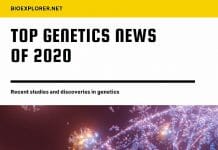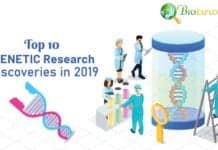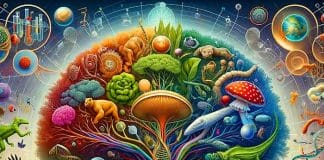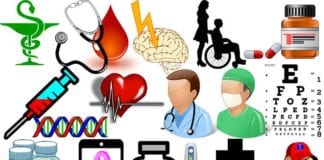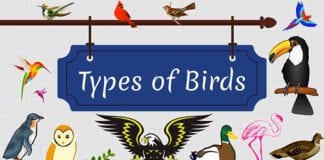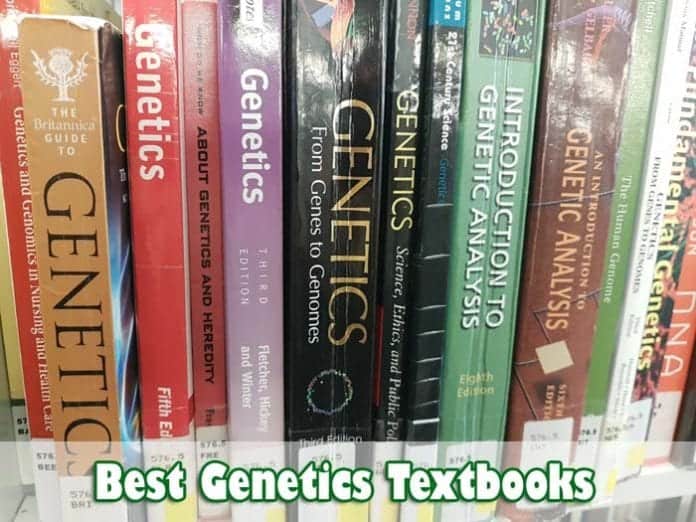
Best Genetics Textbooks: Genetics, or the science of heredity, has significantly evolved in the last 50 years. Medicine, agriculture, evolution, and ecology are now unthinkable without it. That is why introductory genetics courses are required for most degrees in Biology, Ecology, and Medicine.
There are multiple branches of Genetics as well: from more traditional Mendelian Genetics to Molecular Genetics and Genomics that rely on modern methods of analysis and computing.
To understand the intricacies of this science – the students need several quality textbooks to accompany their learning. Here are some excellent examples of those.
Table of Contents
- Best Genetics Textbooks
- 1. Concepts of Genetics
- 2. Genetics: A Conceptual approach.
- 3. Genetics From Genes to Genomes
- 4. Genetics: Analysis & Principles
- 5. Genetics: Analysis of Genes and Genomes
- 6. Principles of Genetics
- 7. Emery’s Elements of Medical Genetics
- 8. Medical Genetics
- 9. Thompson&Thompson Genetics in Medicine, Ninth edition.
- 10. Human Genetics: Concepts and Applications
- 11. Principles of Behavioral Genetics
- 12. Color Atlas of Genetics
Best Genetics Textbooks
1. Concepts of Genetics
Authors: Klug W.S., et al.
The first best genetics textbook in this listing is the 12th edition of a very popular genetics textbook. This book is one of the best genetics textbooks that is intended for undergraduate students and covers the main concepts and ideas of Genetics, as well as more current research and discoveries. This book has several advantages:
- The concepts presented in the textbook are described in clear, concise prose;
- The book has a focus on the problem – solving, which is an essential part of a good genetics course;
- The book describes both the experiments that led to discoveries and the rules and concepts that were the result of the former;
- Newer editions also include descriptions of the current cutting-edge research, such as CRISPR.
- As the textbook is easy to read, it is also suitable as an educational read outside the classroom.
- The book can be bought with an access code for the electronic version, Mastering Genetics, with additional features.
As with any intricate work, there are some disadvantages as well:
- It is not a suitable book for people who prefer facts over descriptions;
- Concepts and ideas are not always well-organized;

2. Genetics: A Conceptual approach.
Authors: Pierce, B.A.
The next genetics book was written for college-level students that need to take an introductory level Genetics course. This book has several good points:
- Main scientific concepts well explained;
- The textbook is well illustrated and has multiple full – color images to make understanding easier;
- This book is up-to-date with most modern discoveries and concepts;
- There is a good study guide accompanying the leading textbook;
- The book can be used for genetics non-majors as supplementary reading;
- The price is affordable for most students.
- There are versions with access codes for a website with homework and additional materials.
There are also some negative issues one has to be aware of:
- The Kindle edition of the textbook lacks page numbers, which makes it challenging to use the textbook in class;
- One should pay attention to what version is being bought – some are not sold with access codes.

3. Genetics From Genes to Genomes
Authors: Hartwell, L.H. et al.
A team of scientists wrote this genetics textbook. It was also intended as reading material for an introductory Genetics course for undergraduate students. Here are some of the positives of this book:
- The book covers both Mendelian and molecular genetics;
- The newest editions contain information on recent discoveries in molecular genetics;
- The book can be bought with an access code to an online e-book version, as well as to Smartbook;
- Excellent illustrations and charts accompany the text inside this book;
- Many courses in colleges require this particular textbook, and it can in part replace the lectures;
There are some negative issues, as well:
- The style of the book is overly wordy;
- The 5th edition lacks some crucial information required in the course;
- The textbook may be more suitable for an advanced class, as it contains much information on more complex issues in molecular genetics.

4. Genetics: Analysis & Principles
Authors: Professor Brooker R.G.
The main attractive feature of this genetics textbook is explaining concepts through experiments. There are several advantages to this approach:
- The students get acquainted with both the main concepts and the history of scientific discovery;
- The students learn how experiments are planned, conducted, and analyzed;
- The textbook encourages the development of critical thinking;
- The textbook can be used for an introductory, one-semester Genetics course;
- The book is supplemented with high-quality diagrams;
- The teaching style of the textbook is very student-friendly;
There are some negative issues to be aware of:
- There are factual errors in the book;
- Some readers find that the organization of the chapters is poor;

5. Genetics: Analysis of Genes and Genomes
Authors: Hartl, D.L., Cochrane., B.C.
This genetics book is intended for an introductory course in Genetics for high school and college students. The book has an entire organization of material:
- The book starts with explaining DNA structure, using the knowledge of the molecular structure of genetic material as a basis for understanding Mendelian genetics and chromosome theory;
- The book chapters can be read in a different order, depending on the preferred focus of the instructor;
- The book also presents crucial mathematical concepts needed for genetic and statistical analysis;
- No negative reviews present for both editions;

6. Principles of Genetics
Authors: Peter J, Snustad, M.J. Simmons.
This genetics book is also a textbook for a one-semester Genetics introductory course. This molecular genetics book covers a wide variety of subjects:
- Molecular genetics.
- Mendelian genetics and chromosome theory.
- Genomics.
- Genetics of cancer.
- Human genetics.
- Evolution and Ecology Genetics.
Besides the broad scope of the book itself, it has other advantages;
- The book has a particular focus on human genetics to keep the students interested and motivated;
- The book provides links to exciting genetics and genomic information present online;
- The Kindle edition is very convenient and easy to navigate;
There are some drawbacks, as well:
- The diagrams present in the book are not very modern;
- The solutions to the problems are not found in the book, but elsewhere;
- Student companion of the textbook is of low quality;
- Some descriptions in the text are overly wordy;

7. Emery’s Elements of Medical Genetics
Authors: Turnpenny, P.D., Ellard S.
The next best genetics textbook is the 15th edition with multiple revisions and upgrading over the years. It is primarily intended for courses in Medical genetics for students majoring in various areas of medicine. Here is what one should know:
- The book covers Human Genetics, applications of Genetics in Medicine and Genomics, as well as genetic counseling;
- The book contains links to additional information online;
- The electronic version of the book also contains interactive self-assessment;
- The book explains both scientific, social, and ethical aspects related to Genetics in Medicine and counseling;
- The textbook is well-illustrated;

8. Medical Genetics
Authors: Jorde, L.B. et al.
The medica genetics textbook is recommended to undergraduate and graduate medical students, students majoring in genetic counseling, nursing, and allied health sciences. Here are some of the advantages of this edition:
- The book can be useful both for students and practicing physicians;
- The book integrates current developments in molecular genetics and genomics about medical practice;
- The book covers the basic principles of molecular biology;
- The textbook also discusses in depths known chromosomal and single-gene disorders;
- The genetics book includes novel methods and approaches in cytogenetics and genomics;
- The textbook contains separate chapters on immunogenetics, genetics of cancer, as well as the genetics of common adult diseases;
- The authors also discuss at length novel approaches to genetic diagnosis using methods available today, including whole genome sequencing;
- There is a Student Consult website that provides additional information and downloadable images;
There are some drawbacks, as well:
- The book is heavily focused on medical applications of genetics, and is not very suitable for undergraduate introductory courses;
- The book may not contain all current information on the subject;
- The textbook lacks details on specific diseases and disorders;

9. Thompson&Thompson Genetics in Medicine, Ninth edition.
Authors: Nussbaum, R.L. et al.
The next genetics textbook is mainly intended for medical students. Here are some features of the book:
- This book is an updated edition that describes new information;
- The book contains multiple clinical case studies of different genetic disorders in humans;
- The book provides a framework for medical genetics study;
- The Kindle edition is easy to navigate between chapters;
- The book contains an excellent glossary and separate solutions to problems presented in the central part of the textbook;
The textbook has a few disadvantages:
- The Windows version of the book does not have a page search option;
- The style of the textbook is not very engaging;

10. Human Genetics: Concepts and Applications
Authors: Lewis, R.
This genetics book is written for college students – both Genetics majors and non-majors. The human genetics textbook is focused on principles of inheritance and genetic disorders in humans. This textbook is highly rated online and on Amazon due to the following positive features:
- The language of the book is simple and easy to read;
- Each chapter begins with a story that students can relate to;
- There are multiple case studies to illustrate various disorders;
- The book covers human evolution and fetal development;
There are some disadvantages, too:
- It is hard to find definitions in the textbook;
- Some chapters in the textbook could be revised to be more reader-friendly.

11. Principles of Behavioral Genetics
Authors: Robert RH Anholt, Trudy F.C. Mackay
Behavior is very complex and depends on environmental, hereditary, developmental, and neurological factors. That is why good textbooks on behavioral genetics are scarce – the discipline is relatively recent, and the progress in this field was noted only a couple of decades ago. Here are the reasons to select this textbook:
- The book covers studies both on model organisms and people;
- The book does not focus solely on genetics, but also includes biological and ecological aspects, as well as fundamental neuroscience;
- The book is based on the actual course taught at the University of North Carolina;
As the discipline covered is still understudied, the textbook has its disadvantages as well:
- The information presented in the book is disorganized;
- The information in the textbook may lose relevance quickly, as the field is continually evolving;

12. Color Atlas of Genetics
Authors: Eberhard Passarge
Genetics is a complicated subject for many. This atlas can assist the visual learning in understanding many of its concepts. Here are some reasons one should buy this best genetics book:
- The atlas offers quality illustrations of central concepts of molecular genetics, cell theory, chromosome structure, and genomics;
- New illustrations devoted to genetic disorders, signal pathways and new methods such as CAS/CRISPR system have been added to the book;
- All images in the atlas are in full color;
- Images are also accompanied by short descriptive texts;
- The book can be useful both for students and professional life scientists;
There is only one disadvantage – the atlas can only be used as a reference resource, not a fully functional textbook.

Genetics is an unusually multi-faceted discipline. It is tough to cover the whole field in one textbook. However, the list presented here contains books that do their best to present the basic principles and concepts of this science – and hopefully inspire students to delve further.















